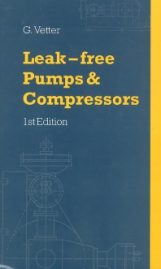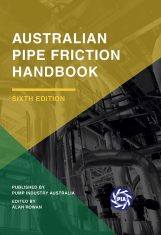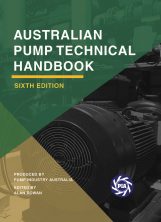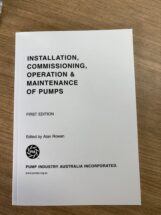- Contact Us On 1300 218 920
Publications
Pipe Friction Handbook
There are only a few copies left and only available until all stock sold.
The fourth edition of PIA’s Pipe Friction Handbook has been fully reviewed and updated to cover any upgrades in Australian Standards since the third edition.
The principal changes to the friction tables, (which remains in the same format as in the previous editions) involve the Polyethylene and ABS pipes.
$90.00 Original price was: $90.00.$50.00Current price is: $50.00. inc GST
Out of stock
There are only a few copies left and only available until all stock sold.
Pump Industry Australia’s Pipe Friction Handbook is a handbook which complements Pump Technical Handbook. The book teaches the user how to calculate pipe friction losses in a wide range of pipe types and sizes, up to in some cases 1800mm. The book includes easy to understand instructions on how friction losses are calculated for straight pipe and a wide range of pipe fittings.
The first section of the handbook covers pipe friction losses which are shown in the form of friction tables which cover the most commonly used pipes in Australia. With the exception of commercial steel pipe which is to ASTM B36:10M standard, all the other pipes and tubes are to an Australian standard. The following types of pipe are covered by the friction tables:
- Commercial Steel Pipe
- Large Fabricated Pipe
- Medium and Heavy Duty Galvanised Steel Pipe
- Uncoated and Cement Lined Ductile Cast Iron Pipe
- Copper Tube
- Brass Tube
- Stainless Steel Tube
- Series 1 and 2 PVC Pipe
- Polyethylene Pipe
- Rural Polyethylene Pipe
- Aluminium Irrigation Tube
- Elastomeric Rubber Hose
- Concrete Pipe
In addition to these tables there is a table for the friction loss of viscous liquids in commercial steel pipe and a chart to allow calculation of friction loss in lay flat hose.
The second section of this handbook covers friction loss factors for valves and fittings and how to calculate friction loss in pump systems. In addition the following tables are included which are useful to the pump engineer:
- Value of Gravity at Selected Australian Sites
- Physical Properties of Water
- Pressure, Boiling Point of Water at Various Altitudes
- Suction Lift Reduction with Temperature.
- Viscosity Equivalents at Constant temperature
- Viscosity of liquids
- Specific Gravity & Temperature Relationship for Various Liquids
- Density & Specific Gravity for Various Liquids
- Approximating Discharge from Pipes
- Irrigation Table
- Discharge from Syphon Lines
- Pressure Surges & Water Hammer
- Acceleration Head – Reciprocating Pumps
- Conversion Equivalents
- Power Transmission – Recommended Flow Rates & Pressures for Hydraulic Hose
The Pipe Friction Handbook covers all a reader needs to calculate friction losses in a pump system and is a handy on-the-job resource is packed with all the formulas, calculations, and practical tips necessary to smoothly move gas or liquids through pipes, assess the feasibility of improving existing pipeline performance, or design new systems.
Recent Product
-
Publications
Leak-free Pumps and Compressors – 1st Edition
$160.00Original price was: $160.00.$85.00Current price is: $85.00. inc GST Add to cart -
PIA Handbooks
Installation, Commissioning, Operation & Maintenance of Pumps
$16.50 inc GST Add to cart







